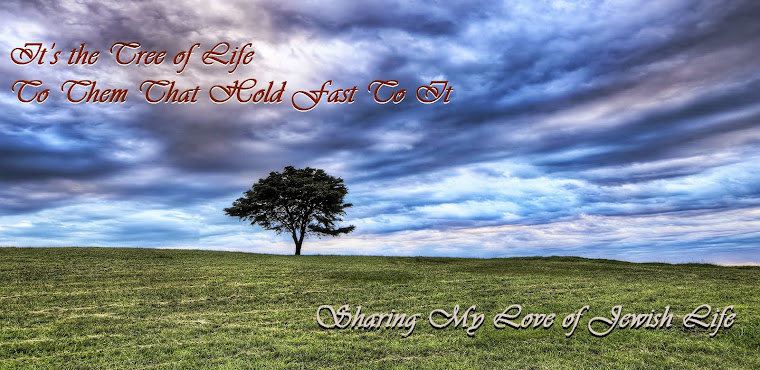Three times in Parshas Vayelech the verse Chazak Vayamatz, be strong and courageous, is uttered, and three times in Parshas Vayelech the text goes into detail about the future downfall of the nation. Be strong, lead them well, expect them to fail, and Hashem will still remember His covenant… this is the message that Moshe receives from Hashem and that Bnei Yisrael receives from Moshe.
It is, of course, not by chance that Parshas Vayelech
is read at the auspicious time of the Yomim Norayim, the “High Holidays.” And
during a leap year (such as this year), we are granted the opportunity to look
at Parshas Vayelech on its own and to focus on its unique message… a message
that is particularly important to remember as we contemplate the impending celebration
of Yom Kippur.
It could, perhaps, be said, that Yom Kippur is a
celebration of humanity. This may seem like a shocking statement, but only
until we realize that if there is one unified character trait of all of
humanity, it is that, try as we might, we make many mistakes. We are not creatures
of instinct, like the animals, nor beings of obedience, like the angels. There
has never been a perfect human nor a perfect society.
Moshe tells the
people not to worry that he will not be entering the Promised Land with them.
He tells them that Yehoshua will lead them by Divine command. And he tells them,
“Be strong
and courageous! Neither fear, nor be dismayed of them [the Cananites], for the
Lord, your God He is the One Who goes with you. He will neither fail you, nor
forsake you" (31:6). Then Moshe gives
Yehoshua a similar message: Be strong and courageous, you will succeed, and
Hashem “will neither fail you, nor forsake you. Do not fear, and do not be
dismayed" (6:8). On this note of positive messaging, his duty of
leadership transfer is seemingly done.
But Moshe isn’t done, and
Yehoshua isn’t ready. It isn’t all a neat little package, and this is the most important
connection to the Yomim Norayim. Now is when Hashem states, not once but twice,
that Bnei Yisrael will not only stray but will bring down Hashem’s fury upon
them. Indeed, Hashem even declares that He will hide His face from them.
In between declarations of the future failings of Bnei Yisrael. Hashem commands Moshe to write a song to bear witness to the future Children of Israel. Only after he has done so does Hashem speak to Yehoshua, repeating, it seems, Moshe’s earlier words: “Be strong and courageous! For you shall bring the children of Israel to the land that I have sworn to them, and I will be with you."
As Moshe hands what he has
written to the Leviim to be placed in the Ark, he concludes his speech of
earlier by stating forthrightly to them that they will, in time, become corrupt
– that they will do evil and will be punished. And so he teaches them the song
he has just written at Hashem’s command.
There are many discussions what
this song is. Was it Haazinu, the next parsha? Was it something not included in
the Torah? Was it a reference to the Torah itself? All are possible.
Why, one might ask, was it so
necessary for Hashem to repeat the future failings of Bnei Yisrael here? After
all, Moshe had spoken of it to the people in his final proclamations recorded
in the other chapters of Devarim. But Moshe needed to acknowledge it here as he
transferred the leadership of the people.
Perhaps the reason that the Torah
tells us one more time, woven with the words Chazak Vayamatz, Be strong and courageous,
is to remind us of the important fact that Hashem is very aware that we are
human. Moshe, perhaps, did not want to end his time dwelling upon the fact that
Bnei Yisrael would struggle, but Hashem knew that acknowledging our struggle
would be the source of our strength, of our ability to move forward.
There are many shiurim available that speak of the annual
self-doubt about teshuva. We all have the thoughts of: “I wanted to improve,
and yet here I stand with the same mistakes, with the same transgressions.” “I
wanted to achieve more than I did, and I feel that I have failed.”
Be strong and be courageous! That is to each and every
one of us. Hashem knows and acknowledges our humanity, our limitations, and the
probability of our imperfections… and He loves us anyway.
Hashem repeats to Moshe that the people will be
corrupted until Moshe accepts it and says it out loud because it needs to be
understood that Hashem already knows our regret. He knows our hopes and our
dreams, our successes and our failures. We will fail, each of us in our own
way, but this knowledge cannot stop us from moving forward, from trying harder,
or from taking a slightly different path.
On Yom Kippur we will each stand before the King of
Kings and beg atonement. It must be done. But we do so not in terror. We do so
in celebration. Yom Kippur is a holiday because we know that Hashem will accept
our repentance, because in foretelling our failings He has already granted
their eventual forgiveness.
May each of you have a Gmar Chasima Tova.
